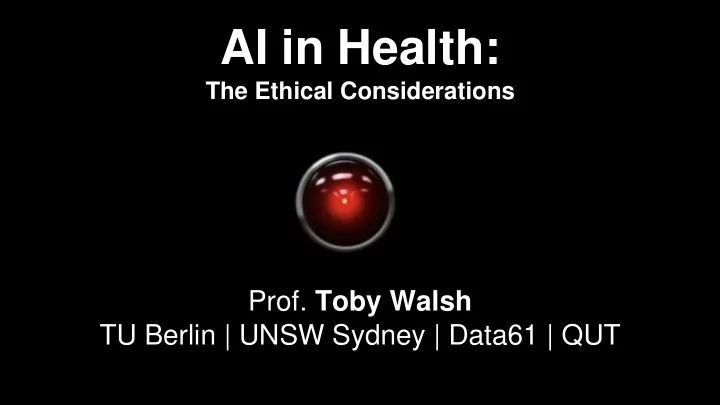

AI in Health: The Ethical Considerations Prof. Toby Walsh TU Berlin | UNSW Sydney | Data61 | QUT
AI principles
AI principles adopted by 42 nations
1. Be socially beneficial. 2. Avoid creating or reinforcing unfair bias. 3. Be built and tested for safety. 4. Be accountable to people. 5. Incorporate privacy design principles. 6. Uphold high standards of scientific excellence. 7. Be made available for uses that accord with these principles.
Is this not just ethics washing? This is not the first technology to touch people’s lives
Principles of medical ethics Autonomy Justice Beneficence Non-maleficence
Principles of medical ethics Autonomy Justice Beneficence Non-maleficence Precautionary principle
Autonomy Respect autonomy of patient (e.g. informed consent)
Autonomy Respect autonomy of patient (e.g. no deception or autonomy of machines)
Justice Benefits (& burdens) spread equally Fairness Respect existing laws
Justice Benefits (& burdens) spread equally Fairness Respect existing laws (e.g. algorithmic bias, racial and other forms of discrimination)
Beneficence New procedures should do good Bring net benefits (utilitarian)
Beneficence New procedures should do good Bring net benefits (utilitarian) We saw this, for example, in Google’s AI principles
Non-maleficence Does no harm to anyone Not the same as beneficence (more egalitarian)
Non-maleficence Does no harm to anyone Not the same as beneficence (more egalitarian) Privacy trade-offs
Precautionary principle When an activity raises threats of harm to human health or the environment, precautionary measures should be taken even if some cause and effect relationships are not fully established scientifically Enshrined in international law (e.g. EU law, Kyoto protocol)
Precautionary principle When an activity raises threats of harm to human health or the environment, precautionary measures should be taken even if some cause and effect relationships are not fully established scientifically Applies very well to uncertain impacts of AI (especially on our mental health)
PAROLE DECISIONS [PNAS 108(17): 6889-6892]
PAROLE DECISIONS [PNAS 108(17): 6889-6892] TEA BREAK LUNCH
Recommend
More recommend